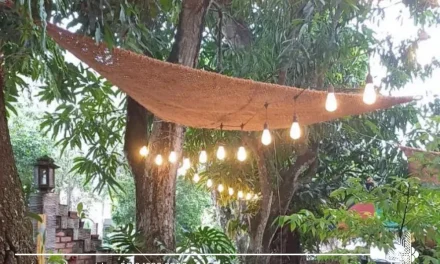The idea of using a shade sail in coconut has become increasingly popular as more homeowners and businesses turn to sustainable solutions for outdoor living. Coconut fibers, known as coir, have long been used in ropes, mats, and brushes, but today they are being adapted into innovative products like shade sails. This unique material provides natural aesthetics, durability, and environmental benefits, making it a strong alternative to conventional synthetic options.

What is a Shade Sail in Coconut?
A shade sail in coconut is essentially a sunshade made from natural coconut fibers, woven or processed into strong panels that can be installed in gardens, patios, or commercial outdoor spaces. Unlike polyester or PVC fabrics, coconut-based sails offer a biodegradable and eco-friendly alternative while maintaining excellent resilience.
These sails bring together functionality and sustainability, offering protection from harmful UV rays while enhancing outdoor environments with a rustic, organic charm.
Benefits of Choosing Coconut Shade Sails
1. Environmentally Friendly Material
Coconut husks are a natural byproduct of the coconut industry, which often produces waste if left unused. By transforming these husks into shade sails, manufacturers help reduce agricultural waste and promote a circular economy. A shade sail in coconut naturally decomposes at the end of its lifecycle, leaving no toxic residue.
2. Aesthetic Value
Coconut fibers carry a warm, earthy tone that integrates seamlessly with wooden decks, bamboo furniture, or garden landscaping. Their natural appeal makes them ideal for resorts, beachfront areas, and eco-conscious homes.
3. Durability and Weather Resistance
Despite being natural, coir fibers are highly resilient. They are resistant to saltwater and microbial growth, which is why coconut ropes have been used for centuries in maritime settings. This same strength is carried into a shade sail in coconut, making it suitable for coastal areas and regions with varying weather conditions.
4. Breathability and Comfort
Unlike some synthetic materials that trap heat, coconut shade sails allow air circulation. This feature helps reduce heat buildup underneath the sail, ensuring a cooler and more comfortable shaded area.
Applications of Coconut Shade Sails
Residential Use
Backyards, patios, and gardens benefit greatly from coconut shade sails. They provide a natural canopy for family gatherings, outdoor dining, or children’s play areas.
Commercial Use
Restaurants, beach resorts, and eco-parks can use a shade sail in coconut to reflect their commitment to sustainability while creating inviting spaces for visitors.
Community Projects
Parks, schools, and open public spaces can install coconut shade sails as part of green initiatives. Their eco-friendly material also sets a positive example for environmental responsibility.
Comparing Coconut Shade Sails with Synthetic Options
Traditional shade sails made of PVC or HDPE are durable and widely available but contribute to plastic waste and pollution. A shade sail in coconut, on the other hand, offers a sustainable alternative without compromising strength.
While synthetic sails may last longer in extreme weather, coconut sails balance durability with biodegradability. For eco-conscious users, this makes coconut sails the more responsible choice.
Installation and Maintenance Tips
Installing a shade sail in coconut is similar to synthetic versions, requiring proper anchoring to walls, posts, or poles. When setting up, it is important to:
- Choose the right size and shape (triangular, square, or custom).
- Ensure sturdy anchoring to withstand wind and tension.
- Treat with natural oils to improve water resistance and extend lifespan.
For maintenance:
- Clean with a soft brush to remove dirt or dust.
- Allow sails to dry completely after heavy rain.
- Inspect regularly for fraying and reapply natural treatments as needed.
Why Invest in a Shade Sail in Coconut?
A shade sail in coconut is more than just a protective outdoor cover; it is a reflection of a lifestyle choice that values sustainability, beauty, and comfort. By investing in coconut-based sails, individuals and organizations contribute to reducing plastic waste while enjoying practical benefits.
The Future of Sustainable Outdoor Living
As awareness of environmental issues grows, demand for biodegradable and renewable products is expected to rise. Coconut fibers have the potential to become a mainstream material in outdoor design. From shade sails to furniture, coconut products represent an important step toward greener living.
Conclusion
A shade sail in coconut combines functionality, aesthetics, and eco-friendliness in one solution. It not only shields outdoor areas from the sun but also supports sustainable practices by utilizing renewable coconut fibers. Whether for homes, businesses, or public spaces, these sails provide a natural, durable, and environmentally responsible alternative to synthetic shades.
For more information, you can reach us via WhatsApp (+62) 812-1233-3590 or email at sales@arlion.co.id.




